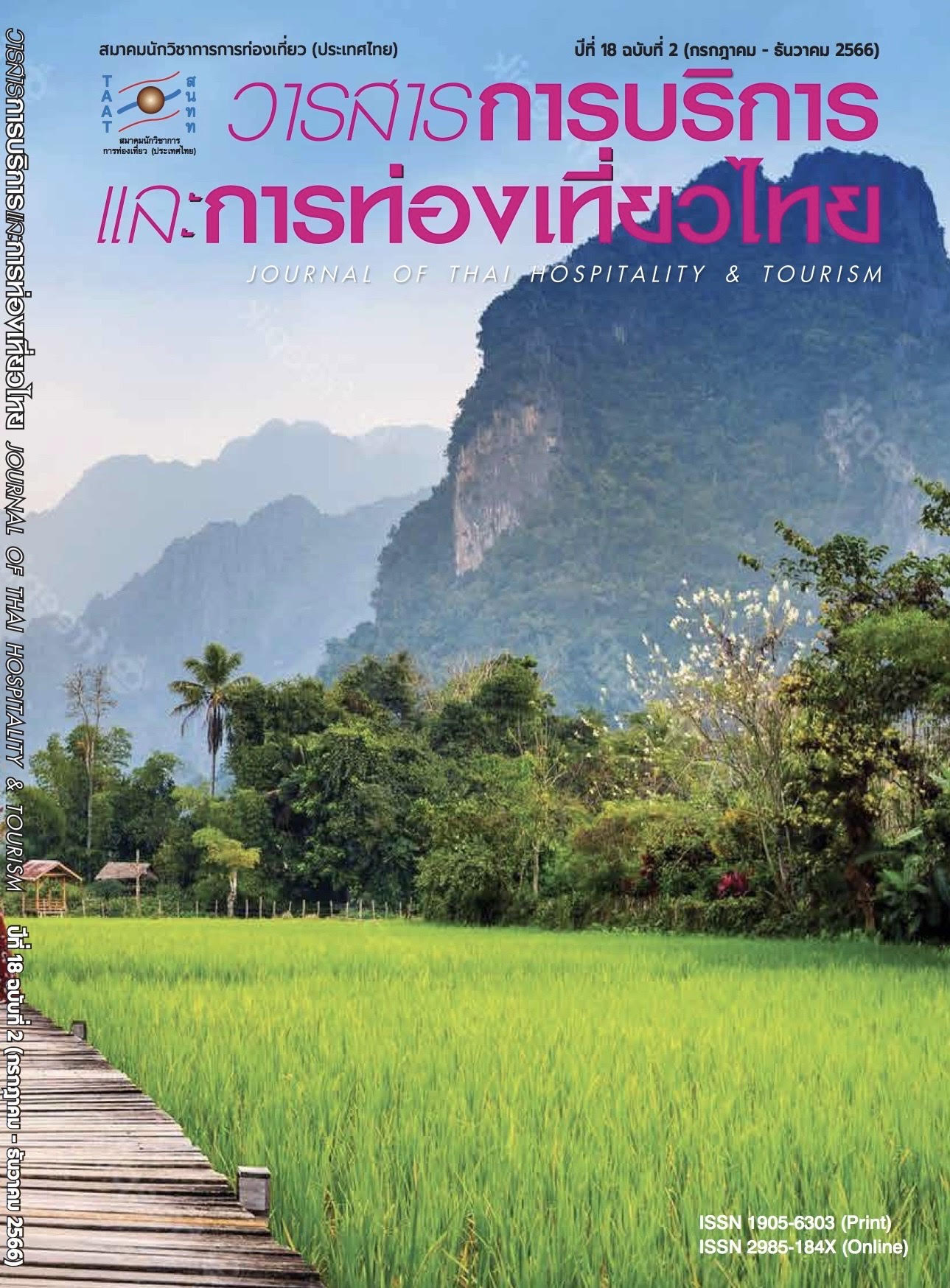การวิเคราะห์ทักษะที่สำคัญของผู้ปฏิบัติงานในธุรกิจการท่องเที่ยวและบริการหลังการระบาดของเชื้อไวรัสโคโรนา 2019
Main Article Content
บทคัดย่อ
สถานการณ์การระบาดของเชื้อไวรัสโคโรนา 2019 (COVID–19) เป็นปัจจัยที่ทำให้เกิดการเปลี่ยนแปลงทั้งด้านการดำรงชีวิต และการดำเนินธุรกิจเกิดการปรับตัวเพื่อการอยู่ร่วมกับบริบทที่เกิดขึ้นอย่างสอดคล้อง ดังนั้นการวิจัยนี้จึงศึกษาถึงทักษะที่สำคัญของผู้ปฏิบัติงานในธุรกิจการท่องเที่ยวและบริการหลังการระบาดของเชื้อไวรัสโคโรนา 2019 (COVID–19) จากมุมมองของผู้ที่ทำงานในอุตสาหกรรมการท่องเที่ยวและบริการ ผู้ตอบแบบสอบถามเป็นผู้ประกอบการและผู้ที่ทำงานอยู่ในอุตสาหกรรมการท่องเที่ยวและบริการได้แก่ ธุรกิจโรงแรมที่พัก ธุรกิจอาหารและเครื่องดื่ม ธุรกิจสปาและความงาม และธุรกิจท่องเที่ยว จำนวน 142 คน การศึกษานี้เป็นการศึกษาวิจัยเชิงปริมาณใช้การเก็บแบบสอบถามออนไลน์ด้วยการใช้ Google Form ใช้การวิเคราะห์สถิติเชิงพรรณนา การวิเคราะห์องค์ประกอบ และการวิเคราะห์แก่นสาระ
ผลการศึกษาพบว่า ทักษะที่มีความสำคัญที่สุดสามอันดับแรก (จากค่าความสำคัญที่สุดคือ 5) ในการปฏิบัติงานหลังการระบาดได้แก่ การจัดการกับภาวะวิกฤต (4.20) การทำงานร่วมกับเพื่อนร่วมงานและลูกค้า (4.11) และความสามารถในการปฏิบัติงานตามแนวปฏิบัติด้านชีวอนามัยและความปลอดภัย (4.09) ผลจากการวิเคราะห์องค์ประกอบพบสามกลุ่มทักษะ ได้แก่ ทักษะกลุ่มความฉลาดทางอารมณ์ ทักษะกลุ่มการคิดวิเคราะห์ข้อมูลเพื่อการตัดสินใจ และทักษะกลุ่มการปฏิบัติงาน
Article Details

อนุญาตภายใต้เงื่อนไข Creative Commons Attribution-NonCommercial-NoDerivatives 4.0 International License.
เอกสารอ้างอิง
Abdelhamied, H. H. S. (2019). The Impact of Training Activities on Quality of Service, Customer Satisfaction and Behavioral Intention. Journal of Tourism and Hospitality Management, 7(1), 135–148.
American Hotel & Lodging Association (AHLA). (2021). State by State Job Less: Covid-19 Continues to Devastate Hotel Industry. https://www.ahla.com/sites/default/files/Fact%20Sheet_2021%20State%20COVID19%20Impact.pdf
Australian National Training Authority (ANTA). (2000). Administration Training Package BSA97: Administration Competency Standards Level 2. https://training.gov.au/TrainingComponentFiles/NTIS/BSA97_3.pdf
Bernard, M. (2020). 8 Job Skills to Succeed in a Post–Coronavirus World. https://www.forbes.com/sites/bernardmarr/2020/04/17/8-job-skills-to-succeed-in-a-post-coronavirus-world/?sh=ff98b162096d
Centers for Disease Control and Prevention (CDC). (2020). Lab Advisory: Outbreak of 2019 Novel Coronavirus (2019–nCOV) in Wuhan, China. https://www.cdc.gov/locs/2020/outbreak-of-2019-novel-coronavirus-2019-ncov-in-wuhan-china.html
Cotton, K. (2001). Developing Employability Skills. Northwest Regional Educational Research Laboratory.
EHL Insights. (2020). EHL Advisory Services Create a Safety and Hygiene Label for Hotels. https://hospitalityinsights.ehl.edu/ehl-advisory-services-safety-hygiene-label-hotels
EHL Insights. (2021). 10 In–Demand Hospitality Resume Skills. https://hospitalityinsights.ehl.edu/hospitality-skills-resume
Katz, R. (1974). Skills of an Effective Administrator. Harvard Business Review, 52(5), 90–102.
Kaushal, V. & Srivastava, S. (2021). Hospitality and Tourism Industry amid Covid-19 Pandemic: Perspectives on Challenges and Learnings from India. International Journal of Hospitality Management, 92, 102707.
Kim, N., Park, J. & Choi, J. (2017). Perceptual Differences in Core Competencies between Tourism Industry Practitioners and Students Using Analytic Hierarchy Process (AHP). Journal of Hospitality, Leisure, Sport & Tourism Education, 20, 76–86.
Kim, S., Kim, J., Badu-Baiden, F., Giroux, M. & Choi, Y. (2021). Preference for Robot Service or Human Service in Hotels? Impacts of the Covid-19 Pandemic. International Journal of Hospitality Management, 93, 102795.
Lunius, R. F. (2020). Soft Skills, “Hospitude” and Affective Hospitality. https://ohma.swiss/en/blog/soft-skills-hospitude-and-affective-hospitality.53
Mallough, S. & Kleiner, B. H. (2001). How to Determine Employability and Wage Earning Capacity. Management Research News, 24(3/4), 118–122.
McClelland, D. C. (1970). Test for Competency: Rather than Intelligence. American Psychologists, 17(7), 57–83.
Shariff, M. N., Kayut, K. & Abidin, A. Z. (2014). Tourism and Hospitality Competencies: Industry Perceptions and Expectations in the Malaysian Perspectives. World Applied Sciences Journal, 31(11), 1922–2000.
Smithikrai, C. (2017). Recruitment, Selection and Evaluation of Personnel Performance. Chulalongkorn University Press.
Weber, M. R., Crawford, A., Lee, J. & Dennison, D. (2013). An Exploratory Analysis of Soft Skill Competencies Needed for the Hospitality Industry. Journal of Human Resources in Hospitality and Tourism, 12(4), 313–332.
World Economic Forum (WEF). (2020). The Future of Jobs Report 2020. http://www3.weforum.org/docs/WEF_Future_of_Jobs_2020.pdf
World Tourism Organization (UNWTO). (2021). The Future of Work and Skills Development in Tourism. https://www.e-unwto.org/doi/pdf/10.18111/9789284421213
Zehrer, A. & Mössenlechner, C. (2009). Key Competencies of Tourism Graduates: The Employers' Point of View. Journal of Teaching in Travel and Tourism, 9(3–4), 266–287.


